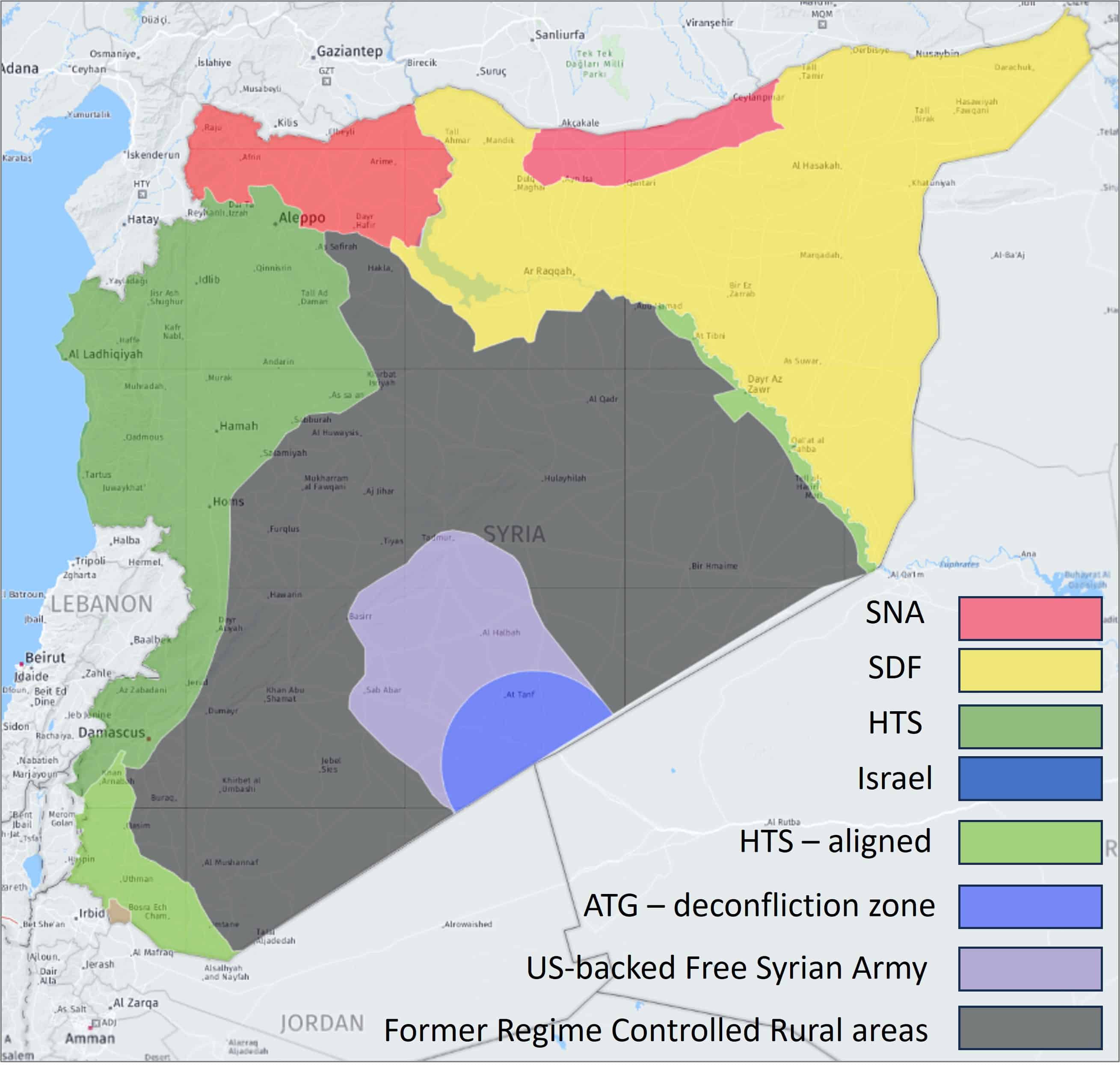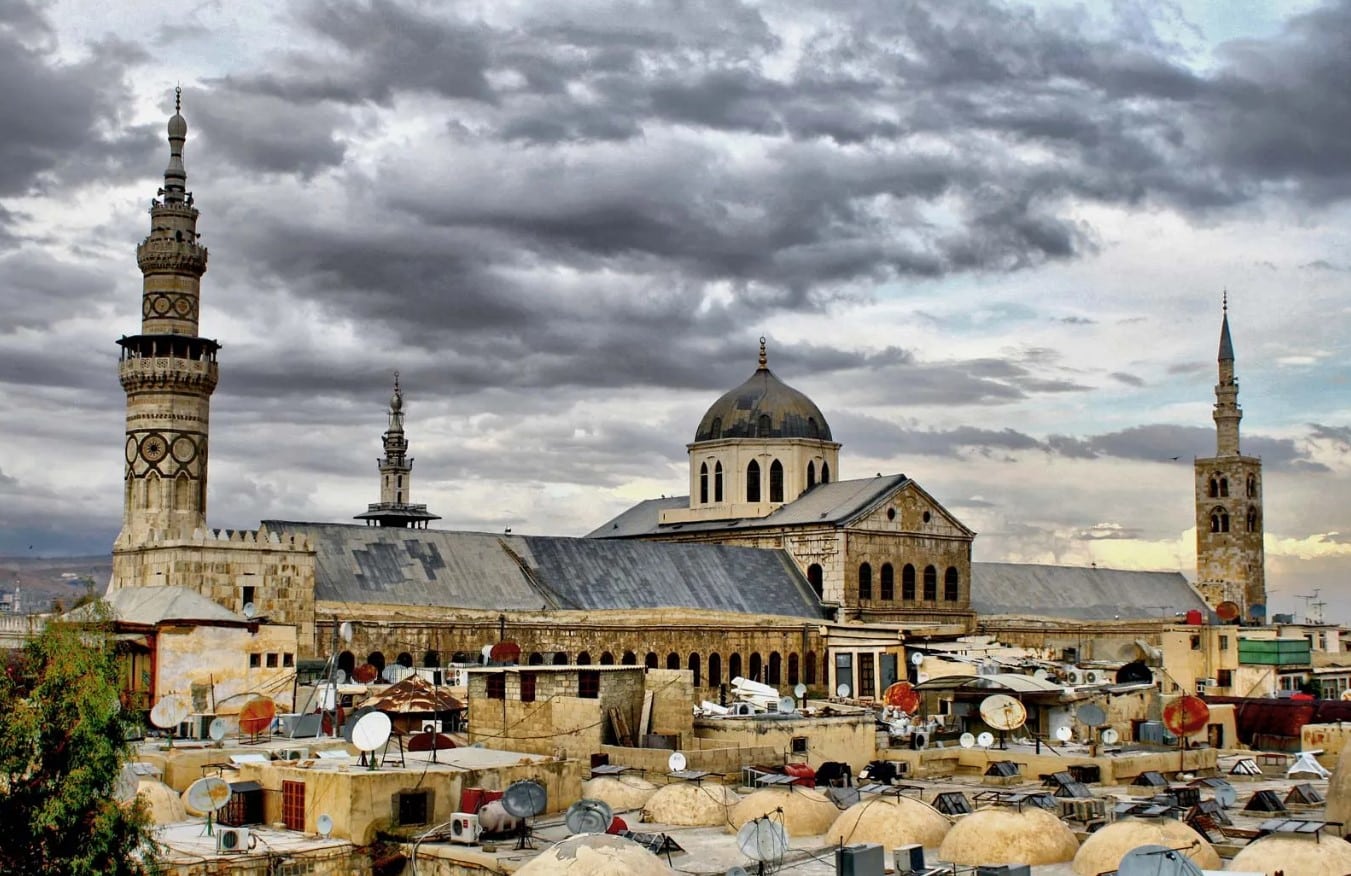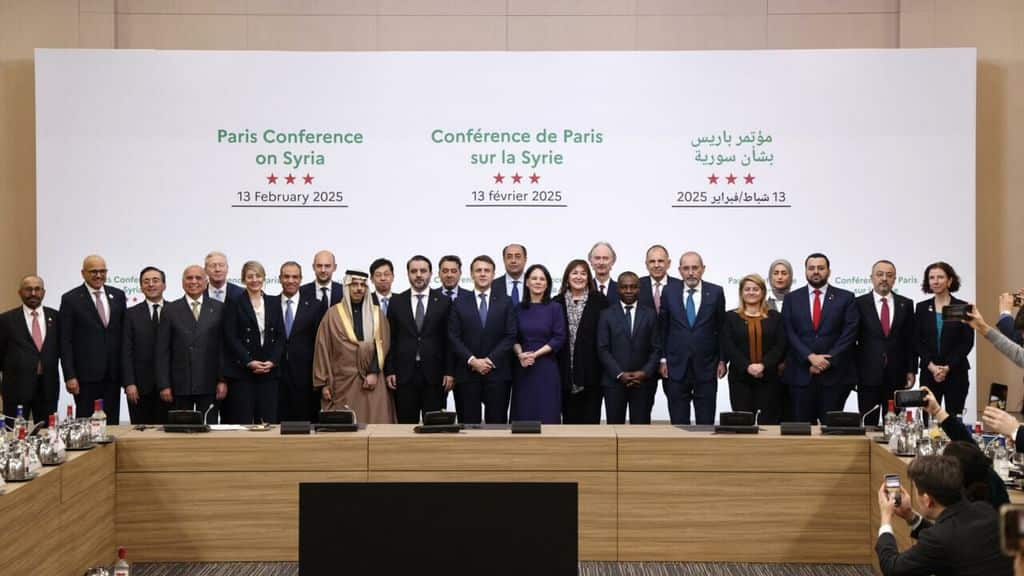Weekly Incident Map
The service will be provided for our existing subscribers for free for a limited time period and then offered as a separate, stand-alone product outside your regular subscription. For inquiries regarding prices for a subscription, or the availability of bespoke reporting on Syria – including in-depth reports, risk assessments and incident data – please email [email protected]. Please also contact us if you are interested in transportation or other security services in Syria. In the meantime, please enjoy this complimentary service.
Executive Summary
-
Interim Government forms preparatory committee ahead of National Dialogue Conference
-
President al-Sharaa visited Latakia as part of countrywide tour
-
France hosted international conference in support of Syria
-
Phone call with Putin highlights pragmatic government stance on Russia relations
Interim Government forms preparatory committee
In a significant step this week, the interim government announced the formation of a committee tasked with preparing the upcoming National Dialogue Conference. The much-anticipated conference is expected to be held in March as a promised step in the political transition and aims to bring together “all” components of Syria. The agenda of the conference remains to be defined, but government officials have repeatedly described the forum as a venue for “deliberations and consultations”, as part of a process to form a new constitution, new government and, ultimately, hold elections beyond the current transition phase. Speaking separately this week, Foreign Minister Assad al-Shaibani indicated that the government remains committed to the original timeline for the transition, which previously pledged to have a new government by 1 March. Concerns and skepticism have been raised in recent weeks as to whether the government would stick by the timeline, yet the move to form the preparatory committee this week marked a significant step in this regard. The committee members included five men and two women – all from different backgrounds but with ties to the HTS and interim president Ahmed al-Sharaa (further details on the committee members are provided in the daily report for 14 February).
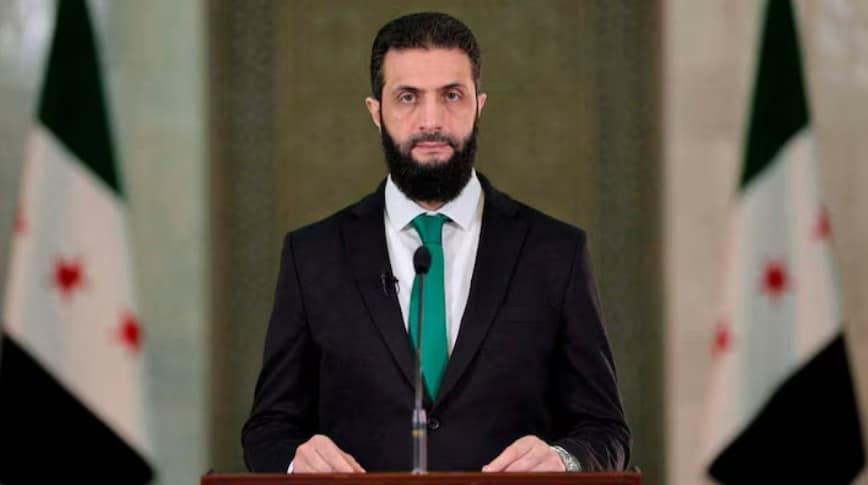
President Ahmed al-Sharaa announced formation of preparatory committee
The composition of the committee was controversial however as no Kurdish members were represented, prompting negative reactions and questions over the government’s commitment to its pledges of inclusion. The Kurdish National Council (KNC) and the Syrian Democratic Forces (SDF) both criticized the omission of Kurdish members and reacted strongly to statements by committee members that “no armed groups” would be invited to the conference. This was immediately interpreted as an exclusion of the SDF which in a statement on 15 February noted that “There is a clear exclusion of political, societal, and national forces, who constitute a large and significant percentage of Syrian society.”
President al-Sharaa visited Latakia as part of countrywide tour
In the days after the formation of the committee, President al-Sharaa embarked on a tour of several key cities, including Idlib, Aleppo, Latakia and Tartous. The visits were clearly intended to demonstrate support and outreach to residents in both former opposition strongholds (like Idlib) and strongholds of the former government as well as Kurdish-majority areas. The visit to Latakia – the birthplace of former President Bashar al-Assad – stood out as particularly symbolic, with footage published by state-linked sources showing the president greeting and exchanging pleasantries with local residents. Similarly, al-Sharaa visited the Kurdish-majority city of Afrin in Aleppo province and spoke of the important role played by Syria’s Kurdish minority.
The visits to Latakia and Afrin clearly intended to display and convey a message of government support for residents in these areas and, conversely, of public support for the government. Further to the above-discussed tensions and negative reactions provoked by the exclusion of Kurdish representation in the preparatory committee, this also follows reports of sectarian tensions and anti-government activity within Latakia and other Alawite-dominated areas. Besides demonstrations, this includes reports of attacks and security operations involving excessive violence against minority residents that continue to be reported on a near-daily basis.
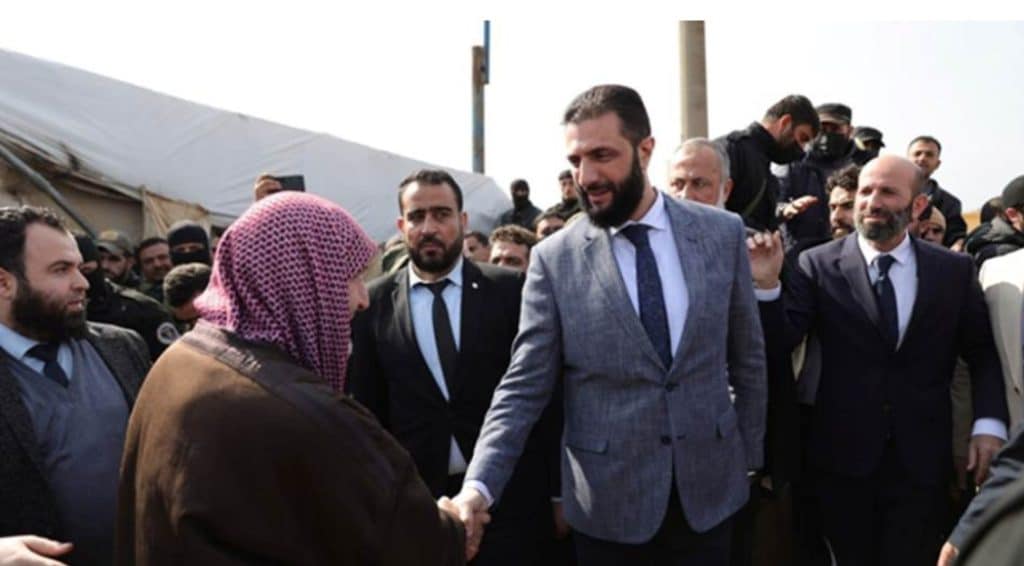
Ahmed al-Sharaa meets residents in Latakia city
The visit to Latakia notably coincided with a demonstration at the Port of Latakia by port workers denouncing the new government as well as reports of armed attacks targeting members of the HTS at a security patrol in the province on the same day. It should be noted that such incidents, while frequently reported, remain on a relatively limited and sporadic scale, and have yet to develop into more coordinated forms of resistance. Regardless, the visit by al-Sharaa, and the associated public rhetoric from the government, stand in contrast to the more complex reality on the ground that is likely to continue to shape security dynamics within HTS-controlled areas.
As discussed in more detail in the daily report for 18 February, the SDF has since adopted a change in tone following al-Sharaa’s visit to Afrin, with SDF commander Mazloum Abdi adopting a tone of reconciliation and engagement with the new government in a speech held on 17 February. The next day, a senior SDF commander claimed on his personal social media account that the SDF “decided” to integrate with the new Syrian Army – a statement that could mark a significant turn of events following the recently frosty rhetoric. Further details remain to be confirmed as of writing, and the SDF has not formally commented on these developments, yet the change in tone is noteworthy and potentially indicative of a breakthrough in the negotiations between the two sides. Further developments will be discussed in the coming days as events unfold.
France hosted international conference in support of Syria
Parallel to the domestic political transition, the interim government continues to engage with regional and Western stakeholders with a view to getting sanctions on the country lifted and establishing more formal international relations. This week, Foreign Minister Assad al-Shaibani attended a conference hosted by France in Paris – the third major international summit dedicated to Syria since December following similar conferences in Riyadh and Aqaba. The summit on 13 February was attended by leaders from the G7 (US, UK, France, Germany, Japan, Canada, and Italy) as well as Turkey and the GCC states. No significant breakthroughs on issues like sanctions relief or humanitarian efforts were announced, but the conference concluded with a joint statement that pledged support for the new government. The statement expressed the participants wish to “ensure the success of the post-Assad transition in the framework of a process that must be Syrian-led and Syrian-owned, in the spirit of the fundamental principles of Security Council Resolution 2254 (2015).”
The statement also expressed support for the “priorities set out by the Syrian President for the transition period” including “establish legal and legitimate governance; preserve civil peace, particularly by setting up a transitional justice system and by preventing individual score-settling; rebuild State institutions, first and foremost the armed forces and the security apparatus, so they may be put to work for the security of the Syrian people; revitalize the country’s economy; restore Syria’s position on the regional and international platforms, on the basis of solidarity, mutual respect, sovereignty and common interests.” A full version of the statement is available here.
While devoid of more tangible results, the conference was a significant diplomatic success for both France and the interim government. This is the first time the interim government has been represented at the event and the release of a final, joint communique signed with such broad support is in itself a significant achievement. Of note, the US was the only participant that did not sign the statement. This was not surprising given that the new Trump administration is still evaluating its policy on Syria and remains overall cautious in its engagement with the new government. Meanwhile, the conference consolidated France’s more optimistic engagement with the interim government. Beyond inviting al-Shaibani to France, Foreign Minister Jean-Nöel Barrot said separately said France will provide 50 million euros to “stabilize Syria” and French officials appear in general prepared to shore up diplomatic and economic support for the government in ways that seem to supersede efforts by other EU countries.
Phone call with Putin highlights pragmatic government stance on Russia
While the engagement with the West continues, the government is also exploring ways to possibly maintain relations with Russia, and even retain Russian military presence within the country. For the first time this week, President Vladimir Putin and President al-Sharaa spoke directly to each other in a phone call that the Kremlin described as “constructive and business-like”. Details were, as expected, limited but the conversation reportedly touched upon various subjects, including cooperation on trade, economics, education and other, non-sensitive areas. More importantly, President al-Sharaa stressed “the strong strategic relationship between the two countries, and Syria’s openness to all parties in a way that serves the interests of the Syrian people”, as per the readout provided by state-linked media.
The rhetoric is noteworthy and signals an important shift from hostility to pragmatism on the part of the Syrian leadership. Further to the visit in January by a Russian delegation led by Deputy Foreign Minister Mikhael Bogdanov, Syrian Defense Minister Murhad Abu Qasra said earlier this month that the new government is open to maintaining Russian military bases in Syria. Speaking at the World Government’s Summit in Dubai on 12 February, Foreign Minister Assad al-Shaibani also noted “recent positive signs” from Russia and Iran. Earlier this week, a spokesperson for the Ministry of Oil further stated that the government might maintain existing oil and energy contracts with Russian companies, assuming they are found to be “legally valid”
The question of military and security matters was not publicly mentioned yet it is highly likely that the two sides also discussed the presence of Russian forces in Syria. Days after the phone call, a report by Bloomberg News citing “informed sources” also noted that Russia is “nearing an agreement” that would allow Russia to maintain a “limited” military presence in Syria. this would include access to naval as well as airbases in the country, with the motivation that Russia would continue to play a role in counter-terrorism operations against IS and other extremist groups. However, the same report noted that while discussions between Damascus and Moscow are progressing, there is no guarantee that an agreement will be finalized and the status of the talks remains somewhat unclear at present.
Regardless, the more pragmatic stance of the government is significant and understandably sets conditions for Russia to retain political and military influence in the country. For the Syrian government, the discussions serve as a source of leverage against the West as well, especially in the context of current efforts to lift sanctions. While not explicitly stated, the government may well use its engagement with Russia as an attempt to put pressure on the West to lift sanctions. That said, this is not without internal risks as segments of the HTS and allied groups that fought Russia during the civil war will likely remain strongly opposed to any engagement with Moscow. President al-Sharaa will undeniably have to navigate such sensitivities carefully to avoid internal pushback or opposition from other Syrian factions. In a possibly related development outside the reporting period, a UAV strike targeted the Russian Hmeimin airbase on 18 February. As discussed in the daily report for 18 February, further details remain limited at this point but the timing of the attack may be indicative of efforts to sabotage the Syria-Russian dialogue and showcase opposition to any future Russian military presence.
Control of Terrain Map – February 2025
